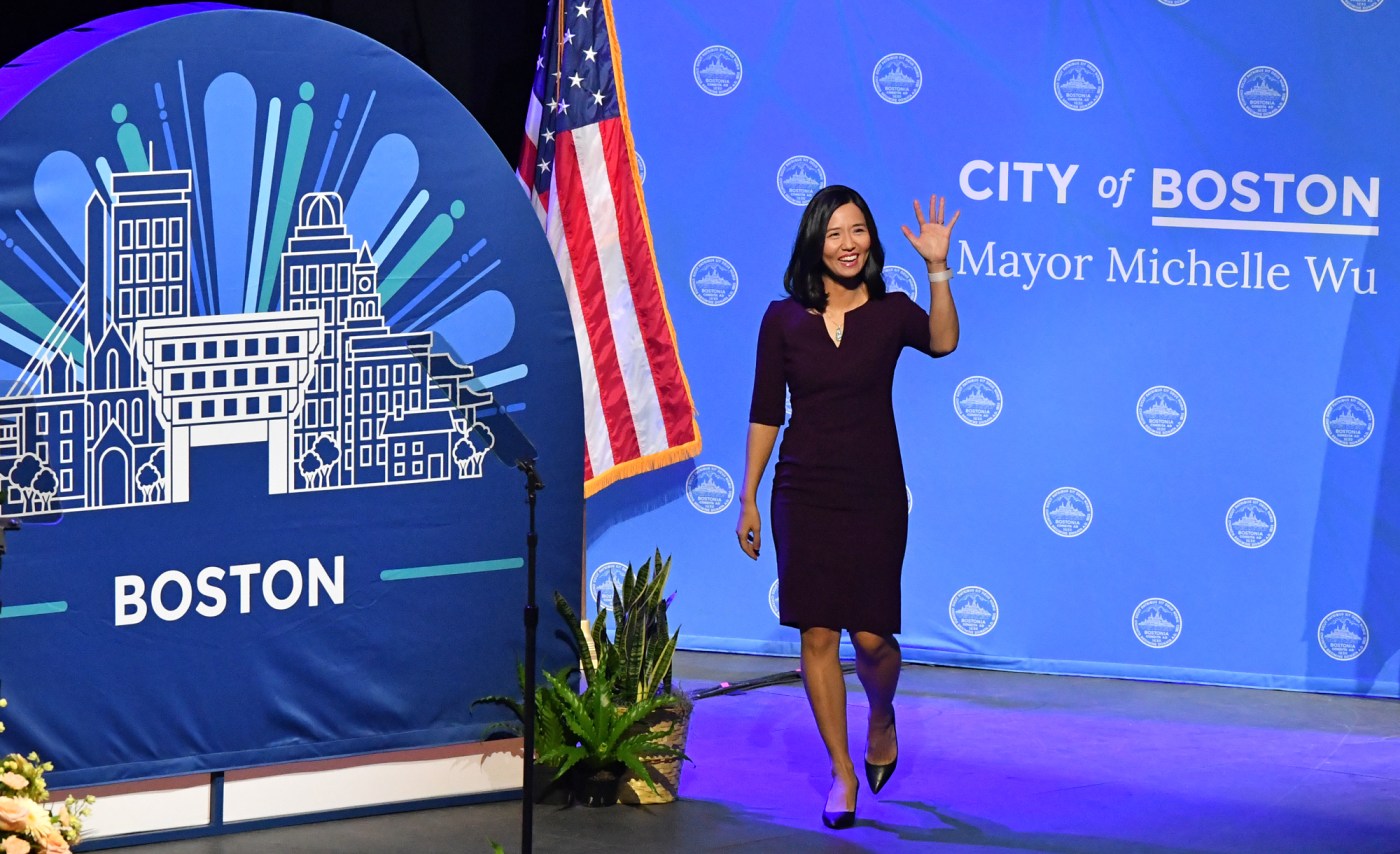
Boston Mayor Wu lays out 2024 vision highlighted by housing affordability, education
Boston Mayor Michelle Wu laid out her vision for the upcoming year, making a number of commitments around housing affordability, public education and green initiatives in her second state of the city address on Tuesday.
Speaking at the MGM Music Hall at Fenway, Wu described the state of the city as “strong,” highlighting prior efforts to improve public safety by clearing tents at Mass and Cass and taking “more than 800 guns” off the streets, before delving into her plans for 2024, which she said will build off promises kept from last year.
“It is thanks to the people of Boston that tonight I can say: the state of our city is strong,” Wu said. “Not because the challenges that remain are simple or small. But because they’re big and they matter, and we are rising to meet them.”
That effort, the mayor said, starts with housing, “because home is the place where everything starts.”
To that end, Wu announced several initiatives built around both improving and preserving housing affordability.
Her administration plans to eliminate barriers to building accessory dwelling units this year, by changing zoning to make these small homes as-of-right on a citywide basis, her office said.
The so-called ADU program allows owner-occupants to create smaller, independent units inside their homes or in their yards — an initiative that “aims to expand lower-cost housing options, empower residents to build wealth, and foster diverse, multi-generational living spaces,” her office said.
Costs for those units will be lowered by publishing pre-approved designs and assisting eligible residents with funds for construction, Wu’s office said.
“Our city has an extreme shortage of affordable homes, and this action will help ensure the city has all the tools at its disposal necessary to tackle this crisis,” Jesse Kanson-Benanav, executive director of Abundant Housing Massachusetts, said in a statement.
“ADUs provide the flexibility that homeowners need,” he said, “while providing much-needed rental homes for more of our neighbors.”
Wu said the city will see its first new net public housing units in more than 40 years, by way of “up to” 2,891 “modern, energy-efficient” apartments that, once built, will be financed and maintained at more than $100 million per year by the U.S. Department of Housing and Urban Development.
The administration has yet, but plans to identify locations for the new public housing units, which will be the first to be built in the city since the 1970s, when 2,200 low-income apartments, rented out by the government, were added.
Related Articles
Boston Mayor Wu to put rejected anti-terror grant before City Council again
Boston City Councilor deactivates X after retaking oath of office
North End restaurateurs file new lawsuit against city for ‘discriminatory treatment’ over outdoor dining
Boston Mayor Wu says city Councilor Tania Fernandes Anderson failed to take oath of office at inauguration
Boston city councilor told to retake the oath of office after viral video
Salima Vo, Vietnamese outreach coordinator of the Asian American Resource Workshop, touted the mayor’s plans as a boon to “low-income families and seniors, who otherwise are at risk of getting rapidly priced out” of their neighborhoods, “while waiting years for a public housing unit.”
Further, 346 families living in the Boston Housing Authority’s Franklin Field community are expected to benefit from a new partnership between the city and National Grid, which will launch the Hub’s “first-ever networked geothermal system, delivering clean, green energy for heating and cooling” to those residents, Wu’s office said.
The partnership, according to the mayor’s office, builds off of Wu’s commitment to rid the city’s public housing of fossil fuels, first announced in her state of the city address last year, and expanded upon as part of a July 2023 executive order that bans fossil fuels in new City of Boston construction and major renovation projects.
Wu also committed, in 2024, to protect 400 families in Mattapan, Brighton and Dorchester from displacement, should their apartments be sold to private investors.
The mayor plans to do that by launching a fund to “acquire apartment buildings and protect renters by making the units permanently affordable throughout a community trust,” her office said.
The initiative builds upon what her office described as a successful effort in East Boston, where 114 families living across 36 buildings were allowed to stay in their homes, by way of an October 2023 Blue Line Portfolio acquisition.
The mayor also committed to improving public education, particularly through a number of expanded early college initiatives for Boston Public Schools students.
In September, Bunker Hill Community College and Charlestown High School will launch the city’s second Year 13 program, which provides a full year of free college courses to Charlestown graduates.
The Boston Public Schools has also signed an agreement with UMass Boston and Chancellor Marcelo Suárez-Orozco to transform the BLCA-McCormack High School into the district’s first University-Assisted Community Hub School.
The agreement, Wu’s office said, will give BLCA-McCormack students “unprecedented” access to UMass coursework, help develop UMass graduate students into future teachers and counselors, and create a “seamless pathway” into UMass for BLCA-McCormack graduates.
Also unprecedented, the mayor’s office said, is the free admission BPS families will get to six of Boston’s cultural institutions, including museums, the New England Aquarium and Franklin Park Zoo, on the first and second Sundays of each month, starting in February as part of a new pilot partnership.
In her speech, Wu also highlighted the addition of 50 federally-funded electric school buses; a restoration of Franklin Park, which coincides with a partnership with Boston Unity Soccer Group to renovate White Stadium; and plans to follow through on restructuring the Boston Planning and Development Agency.
BPDA staff will transition to the city in July, “restoring planning as a core function of city government. The previously announced launch of the “first comprehensive rezoning in decades,” dubbed Squares and Streets, will kick off next month.
“Time and time again, we have proven the future is ours to shape,” Wu said. “And day by day, we’re following through on Boston’s promise to be a green and growing city for everyone.”
Mayor Michelle Wu speaks during The State of the City at the MGM Music Hall. (Chris Christo/Boston Herald)


